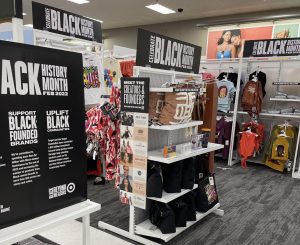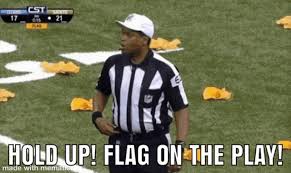Fake activism for a sale?
February 13, 2022
Target is all set up for Valentine’s day. There are multiple aisles dedicated to heart-shaped chocolates, greeting cards, and children’s crafts. For Black History Month there is a single corner with a few books, small trinkets, and a sign indicating what the section is dedicated to.


Comparing the section to last June, when there were multiple displays celebrating Pride month featuring books, music, and clothing (among other things) by LGBTQ+ creators.
Don’t be fooled though because while many companies give a spotlight to the LGTBQ+ community during pride month as soon as the last day of June ends, it all goes away.
Businesses, governments, and even individuals all partake in this act of virtue signaling, or “supporting” something just for the positive response, pretending to support an issue for attention a trend can bring.
The city of Chicago faced backlash when they painted a crosswalk with the pride flag for Pride Month and removed it 27 days later.
This was not a money-making scheme; the city actually lost money paving over the crosswalk. However, the initial painting of the crosswalk was their way of getting into the people’s good graces.
With people becoming more informed, companies like Disney, Amazon, and Nike have all released official statements addressing past and present racism, homophobia, sexism, etc.
On January 20 the Hershey Corporation announced that the female M&M’s would now have different shoes in order to reflect modern times as well as their (apparently newfound) power in society.
Hershey, currently one of the corporations involved in a child labor lawsuit, has chosen now to be “enlightened” on the social constructs of the female gender.
Some companies choose the perfect moment to do or say something, but some just don’t think beforehand.
In 2017, a Pepsi commercial with Kendall Jenner struck controversy. In the commercial, she quickly ended acts of police brutality by handing a can of Pepsi to an officer. This was in the midst of the police brutality occurring with Black Lives Matters protests.
These acts of performative activism, or activism done in order to allow for someone’s social benefit, have become increasingly common in recent years. Though the acts associated with it often do more harm than good.
In the past and present, the representation given is not the representation that is needed. While it may be enough in the future, right now it only seems to be used as a distraction from the fact that members of minority groups are still being discriminated against for simply existing.
Bottom line: companies need to be held accountable and as consumers it is our responsibility to make sure it happens. Letting these things slide, and buying into their messaging and products, just fuels their ability to keep going down the same path. And for our country to do the same.
Consumers can’t just sit around and wait until a big scandal tells them not to use things or do certain things because of their negative effects. They have to research and look for things themselves to figure out what they do and don’t want to support.
Websites like Ethical Consumer give information about companies regarding things from materials they use to how they treat their employees. They can help consumers decipher what companies are doing and what they support.








